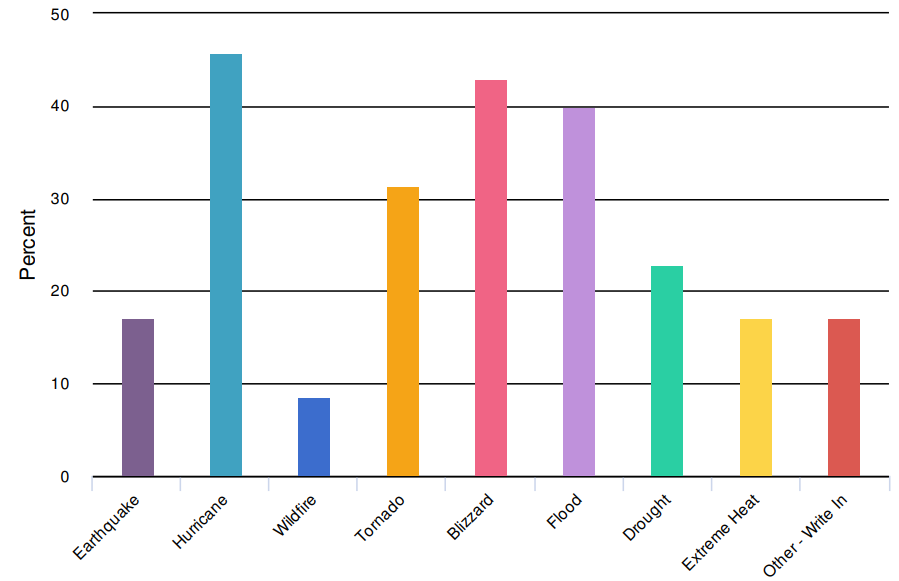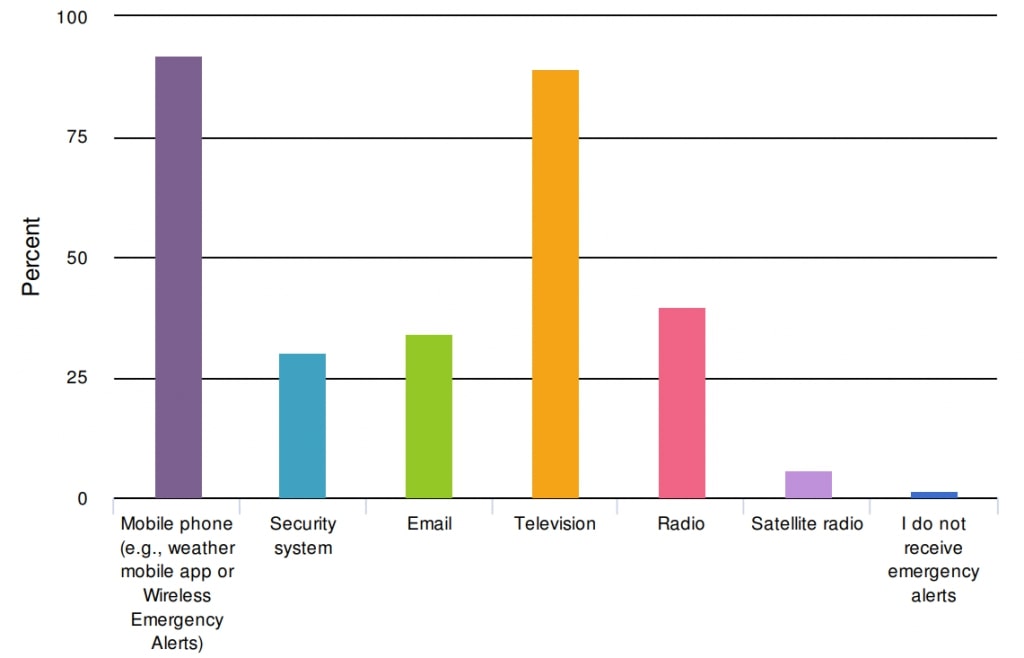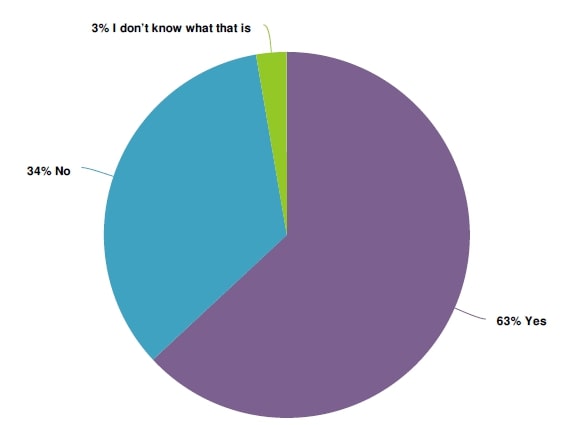Have you ever experienced a storm or another natural event that was so severe, it had a major impact on your home, your family, or your well-being?
Parts of the country are in the throes of a severe hurricane season, while others grapple with devastating wildfires. We recently surveyed a group of Guardian customers to learn more about their experiences with and preparation for severe weather events and various types of natural disasters.
We’re going to share some of our key takeaways, along with essential tips to help you #BeReady for and respond to severe weather. It’s an important part of Ready.gov’s annual National Preparedness Month campaign, and of course, anything that helps keep people safe and secure is important us at Guardian.
Know the natural disasters that occur where you live
50% of our survey respondents have lived through a natural disaster, but only 20% described themselves as “mostly prepared” or “fully prepared” for another event.
As responses came from various metro regions in the United States, the type of events our respondents experienced varied greatly:
What kind of natural disaster have you experienced?

Make sure you know what natural disasters occur in the region where you live, and what time of year. Ready.gov has dedicated resources for different types of disasters on their website, including hurricanes, floods, and wildfires.
Make sure you’re getting alerts for your area
Other than seeing it or physically being in it, how is your average person alerted to a natural disaster? According to our survey, 98% of respondents received alerts on their mobile phone.
How would you be alerted to a natural disaster?

Know how to get emergency alerts and messages before you need them. Resources include:
FEMA Wireless Emergency Alerts. If you have a smartphone that receives text messages, you have probably already received at least one Wireless Emergency Alert, or WEA. WEAs are free messages sent directly to your cell phone, warning you about severe weather, AMBER Alerts, and threats to safety in your area.
They make a unique sound and vibration, designed to get your attention, so don’t ignore them! If you’re unsure if your phone can receive them, contact your wireless provider, or learn more here.
Emergency Alert System. This is a public warning system that uses existing TV, radio, cable, and other systems to send critical messages to the general public. Messages are local or national, depending on the situation.
NOAA Weather Radio. This is a nationwide network of radio stations broadcasting continuous weather information directly from the nearest National Weather Service office. NWR broadcasts official Weather Service warnings, watches, forecasts and other hazard information 24 hours a day, 7 days a week.
Severe Weather Alerts from your home security provider. Many Guardian Protection security system panels have a built-in Severe Weather Alert feature. This ensures that if you are inside your monitored home or business, you will be cautioned if something like a tornado or hurricane is headed your way. It’s designed to give you more time to prepare and help keep you safe. Just like the smartphone alerts we just talked about, not every alert will impact you directly. But it’s one more layer of protection!
Check off the right boxes
Once you know what to expect in your region and have a reliable way to receive alerts, do a walk-through of your home to make sure you’ve got your ducks in a row. If you’re looking for a good starting point for preparing for natural disasters and severe weather, start with going through this list:
- Received first aid/CPR training
- Made a fire escape plan
- Designated a meeting place
- Identified utility shutoffs
- Prepared a disaster supply kit
- Installed smoke and CO detectors
- Installed a water sensor
- Stored food and water
- Stored flashlights and batteries
- Stored medical supplies (first aid kit, medications)
- Have a battery-powered radio
- Have a fire extinguisher
- Have a generator
(By the way, we were delighted to see that more than 90% of survey respondents had smoke and CO detectors, and 68% had fire extinguishers!)
Build an emergency supply kit for everyone in your household, with the goal to have enough supplies to be self-sufficient for at least three days. Learn what should be included in an emergency supply kit, or watch our video on how to make one here.
Organize your important documents
In an emergency, you’ll be grateful to have all the important info you need in order, so don’t wait until disaster strikes to start locating these items. Keep them in a fireproof safe and saved digitally on an external drive or on the cloud. Important documents include:
- Photo ID’s, social security cards, and birth certificates for everyone in your household
- Insurance policies
- Medical information (health insurance cards, medication lists, healthcare providers)
- Home ownership records
- Home security information
If possible, consider saving money in an emergency savings account, and keep a small amount of cash stored in a safe place at home. Check out this video from Ready.gov on how to prepare your finances for natural disasters.
Have an evacuation plan
Our survey revealed 37% of respondents did not have a disaster emergency plan in place.
Do you have a disaster emergency plan?

The possibility of evacuation is one of the most important reasons to have a disaster emergency plan in place. Depending on the emergency, you may have days to evacuate your home, or you may need to leave immediately. In the latter situation, it’s critical to know ahead of time how you will leave and where you will go so you and your family can evacuate quickly and safely.
Map out a primary evacuation route, as well as alternates if your route is blocked. Choose emergency meeting places out of harm’s way — both inside and outside your neighborhood (learn how to make a Family Emergency Communication plan here). A familiar area may become inaccessible in a disaster, so give yourself options in different directions.
If you’re told to evacuate, do so immediately. If you wait to see if conditions improve, you risk getting trapped by severe weather.
What happens to my security alarm system if the power goes out?
Power outages are common in severe weather, so it’s helpful to understand what may happen to your security system. Because Guardian systems have a back-up power source, they will keep working if the power goes out. You may receive a notification on your Guardian app. But keep a few things in mind:
- If the power fails, it will cause your system to beep.
- Your system includes a backup battery that will sustain the system for approximately 4 to 6 hours so the system can continue to have power and protect your home.
- If power continues to be unavailable for several hours, your system will likely restart beeping roughly every 4 hours. To learn more about how to silence beeping on your panel, click here.
- When your panel battery is no longer charged, your system will not operate until the power is restored.
- When the power is restored to your security system panel, the battery will usually start to recharge. Most panel batteries recharge within 24-48 hours.
- If your panel battery does not recharge within 48 hours, the battery may need to be replaced. You can learn how to replace your panel battery by logging on to the Customer Care site, or by checking out our “How-To” series on YouTube.
- You can always test your Guardian system at home to ensure it’s communicating with our monitoring center. You can find the directions for testing your system on the Customer Care website.
In a future post, we’re going to talk about how to involve kids in emergency preparedness. Read more of our preparedness series:
How to create a family emergency plan [FREE TEMPLATE]
For information on how monitored home security can help you and your loved ones prepare for the unexpected, give us a call at 1.800.PROTECT (1.800.776.8328).
*2020 survey responses conducted among a random sampling of 73 current Guardian Protection customers.

